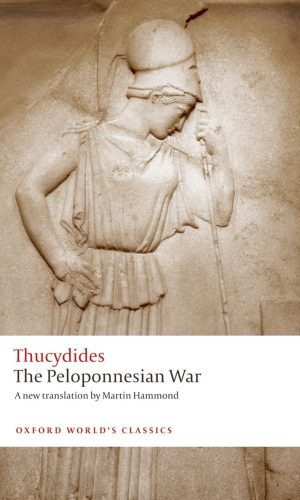Landmark Thucydides
£26.30£33.30 (-21%)
Considered essential reading for generals, statesmen, and liberally educated citizens for more than 2,000 years, The Peloponnesian War is a mine of military, moral, political, and philosophical wisdom.
However, this classic book has long presented obstacles to the uninitiated reader. Written centuries before the rise of modern historiography, Thucydides’ narrative is not continuous or linear. His authoritative chronicle of what he considered the greatest war of all time is rigorous and meticulous, yet omits the many aids to comprehension modern readers take for granted—such as brief biographies of the story’s main characters, maps and other visual enhancements, and background on the military, cultural, and political traditions of ancient Greece.
Robert Strassler’s new edition amends these omissions, and not only provides a new coherence to the narrative overall but effectively reconstructs the lost cultural context that Thucydides shared with his original audience. Based on the venerable Richard Crawley translation, updated and revised for modern readers, The Landmark Thucydides includes a vast array of superbly designed and presented maps, brief informative appendices by outstanding classical scholars on subjects of special relevance to the text, explanatory marginal notes on each page, an index of unprecedented subtlety and depth, and numerous other useful features. Readers will find that with this edition they can dip into the text at any point and be immediately oriented with regard to the geography, season, date, and stage of the conflict.
In any list of the Great Books of Western Civilization, The Peloponnesian War stands near the top. This handsome, elegant, and authoritative new edition will ensure that its greatness is appreciated by future generations.
Read more
Additional information
| Publisher | Annotated edition (8 Jun. 2023), Free Press |
|---|---|
| Language | English |
| Hardcover | 752 pages |
| ISBN-10 | 1416590870 |
| ISBN-13 | 978-1416590873 |
| Dimensions | 18.73 x 3.81 x 23.5 cm |









by MR
A translation which contains references and maps to all the events and places.
This saves the time looking every single place name. Very well organised.
There were one or two missing references even though they had been subscripted otherwise it would have received 5 stars.
It is still the best of its type.
by Jurusz
Although the translation lacks the brilliance and gravity of Benjamin Jowett’s rendition (this edition is based on Crawley’s of 1874) it is more than adequate (so long as the reader does not hanker after Crawley’s Victorianisms) ; but what sets this edition aside is the wonderful reference maps, footnotes, and explanatory material which enable the reader to follow the twists and turns of this epic story. It is understood that the whole of this work was perhaps still work-in-progress when Thucidides left it, his growing appreciation of the machinations of the Persians shows through at times. The account breaks off in the awful year of 411; Athens, tragically, was finally destroyed as a power in 405.
Those readers who are familiar with Sophocles’ “Oedipus the King” may wish to reflect on the portrayals of Pericles through his speeches and those of Oedipus; and Thucidides’ description of the plague in Bk. 2.47 et seq. in 430. Pericles died in 429, the year in which the play was first performed, and the character of Oedipus and the memory of the plague would have been vivid in the minds of the audience.
by Mr Wood
The copy of the book I received was heavily marked and the text underlined so wasn’t exactly in good condition.
by AMX
Thucydides original and direct translation is excellent but challenging. Robert B Strassler however has distilled and presented this wonderful 2500 year old material in a highly accessible approach. The almost 3 decades long savage and brutal conflict from 431 to 404 BCE, between the two superpowers of the time, Athens and Sparta, seems to be more relevant than ever. Curiously enough, if one was to remove the weapons/arms technology from the context, the rest confirms that the traits of human behaviour remain almost unchanged. Politics, policies, diplomacy, strategies, tactics, peace treaties, logistics, rhetoric, revenge, retribution, intelligence, etc., are all in this magnificent history.
by Robert Rivers
As a student at uni currently studying ancient history, I found this translation of Thucydides’ History of the Peloponnesian War to be incredibly helpful in understanding the chronology and the characters of the Peloponnesian War, and hugely useful for revision, what with the summaries, maps, references, index, and editing. Just sad there couldn’t be more landmark histories for everything I’m studying!
by David Disley
All I can say is, “WOW – What a book”. If, like me, you always wanted to read Thucydides’ “The Peloponnesian War” but just couldn’t quite get to grips with it, then this is the version you need. As well as the text, the author has had the presence of mind to include sidebar notes, maps and footnotes to explain the history of the time, which is very useful to the layman. I like it so much that I’m going to order the books in this series. Highly recommended.
by M.I.
The Peloponnesian War (431-404 BCE) is little known in present times, yet we could learn so much from it. The historian, the first in Europe, Thucydides, served in it and was exiled for failure to hold a fortress. It can be difficult reading (I’ve translated it), mainly because so many place names are now unfamiliar. Strassler does much to help with this. We don’t know why the author never finished the work, after eight volumes in great detail. Books 6 and 7 are especially valuable in warning us against the urgings of charlatans, even now. I recommend this along with Kagan’s work on the subject and Hutchinsons’ ‘Attrition’. Brutal as the conflict was, what followed was arguably worse still under a puppet government.
by PAULO J PERES
Excellent value for money. Clearly organised and concise. Language has been adapted for ease of reading without loss of accuracy. Illustrated with the just the right amount of maps – they are really informative and succint. The maps help position the reader in context across the whole book and also where he/she is in the historical events so brilliantly narrated by Thucydides. Cross references with other parts of the book are also quite helpful. A must-have item for political science, strategy and history students.